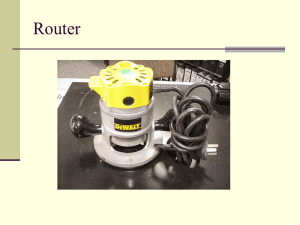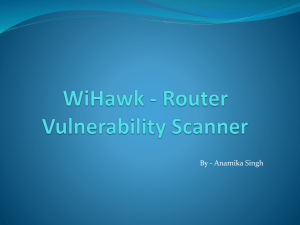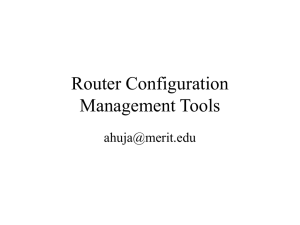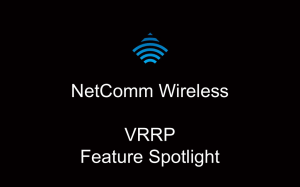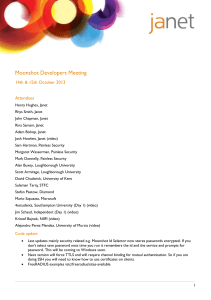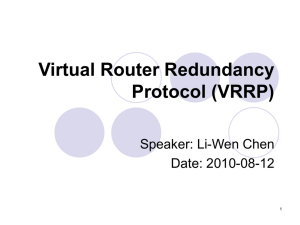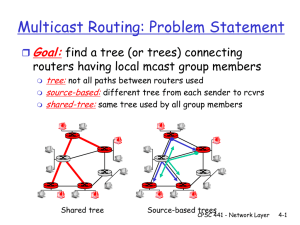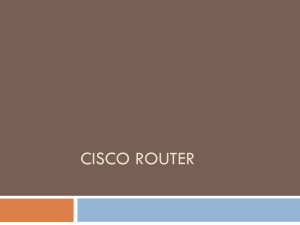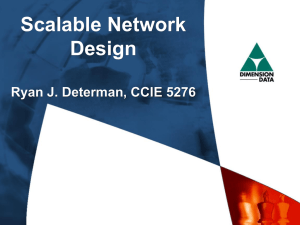Trust-Router-Overview-IETF86
advertisement
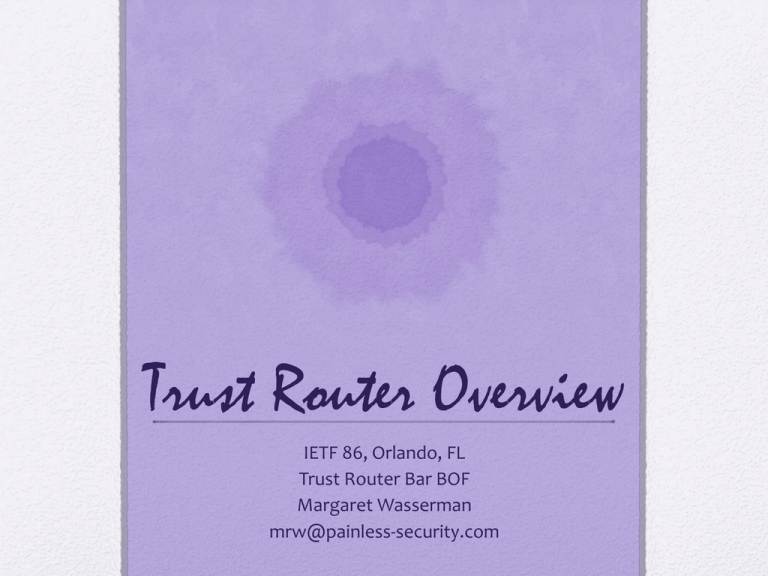
Trust Router Overview
IETF 86, Orlando, FL
Trust Router Bar BOF
Margaret Wasserman
mrw@painless-security.com
Trust Router Draft
• https://datatracker.ietf.org/doc/draft-mrw-abfabtrust-router/
• Describes the role and purpose of a Trust Router
• Defines the concept of communities
• COIs and APCs
• Defines two protocols
• Temporary Identity (TID) Protocol
• Trust Router Protocol
Trust Router Overview
• Trust Router Operation
• Communities
• Temporary Identity Protocol
• Message contents
• Role of Trust Router as gateway
• Trust Router Protocol
• Message contents
• Trust link types
• Implementation Status
Trust Router Operation
Communities
• Authentication Policy Communities (APCs)
• Used to authenticate access to RP Services
• Communities of Interest (COIs)
• Group of RP Clients, IdPs and Trust Routers that
share access to a set of services
• COI must be resolved to an APC (for a given IdP
Realm), before authentication can be achieved
Temporary Identity Protocol
• Used by an RP to negotiate a Temporary
Identity on a (set of) AAA Server(s) in a target
realm
• TID Request is sent to the RP’s local Trust
Router and forwarded across a Trust Path to
the target AAA Server(s)
• Response is returned by reversing the Trust
Path
Temporary Identity Protocol
• Simple request/response protocol
• Messages are encoded in JSON
• Uses GSS-API for authentication
• Request include ½ of a DH exchange
• Server replies with a list of AAA Server IP Addresses
• Response includes the other ½ of a DH exchange for
each AAA Server
• Both ends can compute a shared key that is used for
the subsequent AAA authentication
• Key cannot be computed by intermediate Trust Routers
Example TID Request
{"msg_type": "TIDRequest",
"msg_body":
{"rp_realm": ”mit.edu",
"target_realm": ”oxford.uk.ac",
"community": ”abfab-hackers.communities.ja.net",
"dh_info":
{"dh_p”:
"FFFFFFFF…",
"dh_g": "02",
"dh_pub_key":
"FBF98ABB…”}
}
}
Trust Router as TID Gateway
• Trust Router receives a TID Request from an RP Client
(e.g. AAA Proxy)
• Determines appropriate APC for the community
included in the original request
• If different, moves original COI into orig-coi field
• Finds matching rp_client entry (from gss_name),
applies filters, and adds constraints to the message
• Determines “Trust Path” and adds it to the message.
• Forwards message to AAA Server (or next hop Trust
Router)
Trust Router Protocol
• Runs between pairs of Trust Routers
• Configured as “peers” with GSS credentials to reach
each other
• “Routing” protocol used to dynamically distribute
information about
• Available Trust Links
• Used to route TID requests and responses across
the federation
• RP Client membership in COIs
• APC to use for each IdP Realm/COI pair
Trust Link Types
• Trust Link Types (named by target type)
• Routing Links
• Trust Router Link
• Indicates that the originating trust router can provide temporary
IDs to reach the target trust router
• IdP Realm Link
• Indicates that the originating trust router can provide temporary
IDs to reach the AAA servers in the target realm
• Information Flooding Links
• COI RP Membership Link
• Indicates that the the target RP Client is a member of the
indicated COI
• APC Link
• Indicates that authentication for a target realm and COI should
use the target APC
Trust Path
• A Trust Path is a set of Trust Links that forms a
path across a federation between an RP and
the AAA Server(s) in a Target IdP Realm
• A Trust Path is valid for a given Community
• Trust Routers forward TID
Requests/Responses along Trust Paths,
ultimately resulting in a TID that the RP can
use to reach AAA Servers in the Target IdP
Realm.
Questions?
